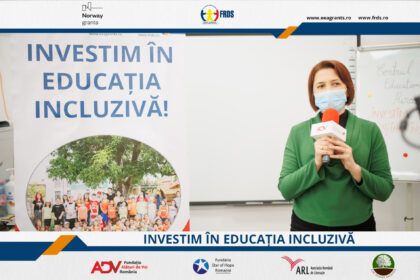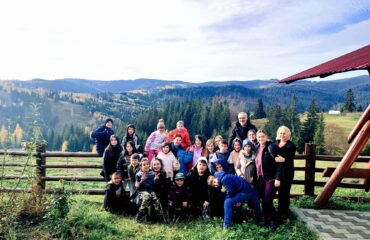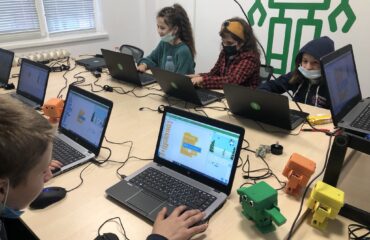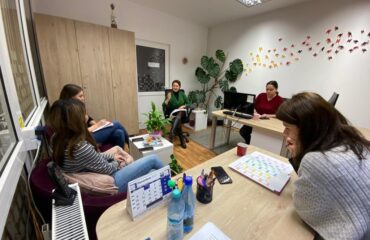
The Norwegian grants, through the Romanian Fund for Social Development, support the education of children at risk of school leaving and with special educational needs in the North-East region
Children and young people at risk of school leaving/early school leaving and with special educational needs (SEN) from three communities from Iasi County – Miroslava, Cornesti and Hornesti will benefit from free services in educational centres set up to provide activities to improve the activity at school and life skills, career guidance and overcoming crisis situations.
- Three schools in the North-East region have a new space for activities of “School after School” type for pupils at risk of school leaving and with special educational needs (SEN);
- 500 children and young people from Miroslava, Cornesti and Horlesti will be able to benefit from an integrated package of services aimed at increasing school and social participation;
- The educational centres have been provided with modern furniture and IT equipment, educational materials, stationery, and hygiene-cleaning products intended for the pupils in the target group;
- Educational centres will also host training programs for teachers in schools, with a focus on innovative teaching methods.
Three educational centres equipped with modern furniture, state-of-the-art IT equipment and educational materials were inaugurated in the context of the project “Investing in Inclusive Education!”, Code PN2041, implemented by ”Alaturi de Voi” Romania Foundation, in partnership with Star of Hope Romania Foundation, Romanian Literacy Association and GAL Stejarii Argintii Association, under the call “Inclusive Education for children and young people at risk”, under the Program ”Local development, reducing poverty and increasing the inclusion of Roma”, project financed by the Norwegian grants 2014-2021 and managed by The Romanian Fund for Social Development (FRDS).
“We have set out a beautiful and ambitious goal – to develop an integrated package of educational, psychosocial, psycho-pedagogical, occupational, non-formal education and leisure services for children and young people in risk categories but not only in the community itself, from the grassroots. At the level of the whole project, we have set out to work with 650 children and young people, aged between 3 and 18, from Iasi and Botosani Counties, and we believe that their number will be even higher because there is interest in the project, in services, and this pandemic has redirected our resources in a way that best meets the needs of these children and young people so that we can make an impact. What we want to see as the final impact is to reduce the risk of school leaving and to have these educational centres that continually support these young people, beyond the targeted intervention under the project.” said Angela Achitei, President of ADV Romania.
The educational centres operate within the three educational institutions with the role of associated partners in the implementation of the project – “Colonel Constantin Langa” Secondary School from Miroslava, “Dimitrie Anghel” Secondary School from Cornesti, the Secondary School from Horlesti, Iasi County.
The opening of the centres took place between 8 and 10 February 2022 in three hybrid events – with physical presence at the premises of the educational centres and with the online participation at a Zoom videoconference. The events were attended by the representatives of the Romanian Fund for Social Development, representatives from local authorities, directors and teachers from the schools hosting the centres, project partners, specialists involved in the provision of services, volunteers and some of the children participating in the activities of the centres.
“We enjoy every time we can make direct contact with what happens in the territory because we are the ones who have made the design, built the program, and followed its implementation. It is very important for us also to get closer to the communities to which funding has been directed and to be able to feel what is happening in the territory. Therefore, this kind of events are also a direct link to projects for us. We know, from the past mechanism, that the projects aimed at children and young people in risk situations are very necessary and useful. As such, this direction is the strongest in the program – with projects that will have results indeed, and we hope that your project will deliver sustainable results because we already know you from the past mechanism and we know that you have systematically informed us those things are continuing.” – said Mihaela Peter, executive director of the Romanian Fund for Social Development (FRDS)
The events were also broadcast live on the Facebook page of “Alaturi de Voi” Romania Foundation. More than 300 people attended in total the three events online – representatives from local public authorities, representatives of the NGOs, teachers, children, and young people from the target group of the project, their parents and guardians, people from the community.
These three public events were a good opportunity for the community to discover the benefits of a project for vulnerable children and young people, which through integrated and collaborative intervention can overcome the crisis situations and hope for a better future. Together with the statements of the grant manager, of the local public authorities and of the project partners on the impact of these educational centres, the participants in the events had the opportunity to see the facilities of the centre, to meet the children and experts providing services in the centres, find out the benefits for the community and how to access them, discover how to get involved and how these investments will be harnessed in the future.
“The project brings a new model of integrated intervention, a sustainable partnership, an integrated model of services for children, parents, and teachers. The idea of this project started from the desire to offer services to children on all these levels – social, psychological, educational, occupational, services for children and young people, services for parents and teachers. We want to reach the soul of the children and create a non-formal environment, because only in this whole, in this complete picture of formal, informal, non-formal services, children will be able to acquire information that will help them for their entire life!” – emphasized Diana Vasiliu, manager of the project “Investing in Inclusive Education!”
The role and benefits of educational centres
The role of the educational centres is to complement the formal part of the training by providing a space, which through its specific facilities and activities, ensures the improvement of school activity through non-formal activities. The aim is to contribute to preventing early school leaving and to improving the school situation of children and young people aged between 3 and 18 at risk of school leaving/early school leaving and with special educational needs. By the end of the project, in the educational centres from Miroslava, Cornesti and Horlesti, 500 children will benefit from various services – psychosocial services, specialist speech therapy services, leisure activities and personal development activities, counselling and vocational guidance, psycho-educational support, educational support through “school after school” programs. The three centres will also host training programs for 75 teachers, who will learn about teaching strategies for children and young people at risk of early school leaving and with SEN.
“Beyond the physical facilities, the human part of all the partner centres and institutions counts enormously, because they have been involved in this project. We, GAL Stejarii Argintii Association, have facilitated, we have been a catalyst for the community, for the school, for the NGOs involved, and we have dealt with the equipping of the three centres from Iasi County. Each centre has a story. Even if the furniture, the physical part, and the electronic part are the same, we have adapted to what the teachers have told us. In a non-formal, comfortable, and relaxing atmosphere, we wanted to create a different environment where the children would come with joy. We hope to develop and pass on what we have achieved, since we want this project to continue. We want the colleagues from the local action groups in the North-East to take on what will be good. We want to come up with a model of good practice that can be replicated at national level. “– stated Irina Manuela Nenerica, manager of GAL Stejarii Argintii Association.
Educational centres – models of intervention within the community
The project “Investing in Inclusive Education”, proposes a sustainable partnership and a model of intervention linked at child/young-family-school-community level.
The idea for the establishment of these centres is to provide a model of intervention in the community, to achieve a transfer of expertise, to stimulate partnerships and connections, to inspire the community.
All these mobilized resources will contribute to maintaining and operating the educational centres even after the completion of the project. The investments in the facilities of the spaces will continue to generate value for the community, enrich the educational process and allow the innovative approach of the educational process. We are certain that by involving public authorities, teachers and volunteers, the work of these centres will continue after the project is completed, ensuring the sustainability of the investment.
Ask for details about the participation in the activities of the centres
For Miroslava, Cornesti and Horlesti: 0755 854 545 / 0747 809 615
For Botosani: 0740 635 441
Discover the Educational Centres
To discover details about the releases, watch the videos:


 Română
Română 

